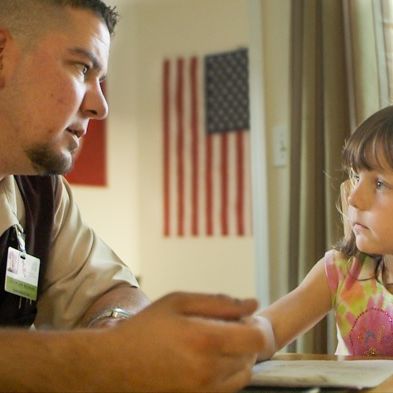
Of Men and WarÔÇÖs compassion is matched only by its relentlessness. Laurent B├®cue-RenardÔÇÖs observant documentary was shot from 2008 to 2013 in and around the Pathway House, a ÔÇ£transition home for combat veteransÔÇØ in the Napa Valley. That right there is actually more context than the film itself initially offers: With little ornamentation or artifice, it gives us the words and faces of Iraq and Afghanistan vets struggling with post-traumatic stress; we donÔÇÖt know these guysÔÇÖ names, or the specific circumstances of their service. B├®cue-Renard doesnÔÇÖt so much follow as drift, from person to person, sometimes from family to family. What emerges is a tapestry of despair, one defined by its persistence.
Much of the film is built around group therapy sessions in which the veterans relay the experiences that haunt them. B├®cue-RenardÔÇÖs camera is unflinching as these men tell tales of unthinkable horror. One speaks of shooting a guy who was running, and of how the manÔÇÖs brain fell out as they picked his body up. (He remembers trying to close the dead manÔÇÖs eyes. ÔÇ£That shit doesnÔÇÖt always work,ÔÇØ he recalls. ÔÇ£So you┬átried┬áto close his eyes?ÔÇØ the therapist asks. ÔÇ£Well, the one eye he had,ÔÇØ the soldier responds, before breaking down.) Another remembers an 8-year-old girl who was instantly killed when he kicked open a door, and of how he then took out his anger and frustration on the girlÔÇÖs mother. Another recalls how an unused round accidentally left in his rifle wound up blowing his friendÔÇÖs face off while they were just sitting around. These men are not cavalier or cool about these experiences; these memories wonÔÇÖt let them go ÔÇö wonÔÇÖt ever let them go, we suspect.
As they speak, the men often teeter on the jagged edge of grief, sometimes before breaking down completely. Many of them wear sunglasses. Some look away. Others plant their heads face-down on the table. We see how trauma manifests itself differently in each one: Some are eerily still, some are angry at the world, some are outwardly consumed by agony. One guy, who constantly rubs his hands and legs nervously, his voice frayed, reflects later: ÔÇ£I still canÔÇÖt get used to the way I am.ÔÇØ (An odd little detail: Throughout much of the therapy session, held in an empty, nondescript room, a green St. PatrickÔÇÖs Day hat sits on the table, like an insistent, festive fuck-you to these menÔÇÖs inescapable reality.)
These are not things you ÔÇ£get overÔÇØ in any traditional sense.┬áOf Men and War┬áshows us scenes of these men with their loved ones ÔÇö who have themselves been tested in unexpected, unthinkable ways ÔÇö and it often cuts from agony to solace, then back again. The man talking about his friendÔÇÖs death, and of how heÔÇÖll never forgive himself, is then seen combing his own daughterÔÇÖs hair before putting her to bed, as the girl tells him how much she loves him. We cut from a wedding to another guy talking about how he used to put a loaded .45 in his mouth. Near the end, we visit with a woman whose son killed himself, years after he seemed to have stopped talking about it. The despair, we sense, cycles and continues, emerges and reemerges. You move on, you move through, but you never, ever leave it behind. The movie, like war itself, is an open wound.


